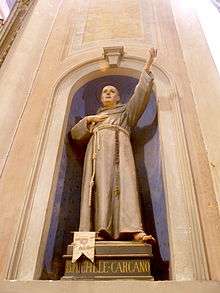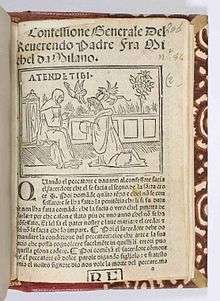Michele Carcano
Michele Carcano O.F.M. Obs. (Michael de Carcanis de Mediolano) (Lomazzo,[1] 1427- 20 March 1484) was an Italian Franciscan preacher. He is known for his part in founding the montes pietatis banking system, with Bernardine of Feltre.
Blessed Michele Carcano | |
|---|---|
 | |
| Universal preacher of the Church | |
| Born | 1427 Lomazzo, Duchy of Milan, Italy |
| Died | 20 March 1484 Lodi, Duchy of Milan, Italy |
| Venerated in | Catholic Church |
| Feast | 20 March |
| Attributes | cross, skull, |
| Patronage | Sant'Anna Hospital chapel, Como |
Background

The Montes Pietatius were charitable institutions of credit that lent money at low rates of interest, or without interest at all, upon the security of objects left in pawn, with a view to protecting persons in want from usurers. As Christians were forbidden to practice usury, i.e., taking loans on interest, it created a sort of monopoly of the credit business to the Jews. However, the so-called "Coarsini" (named after the town of Cavour in Piedmont), and the Lombards, who were a kind of travelling bankers, often charge interest much greater than Jewish lenders.
Life
Michele Carcano was born in 1427 to a noble family of Milan, he joined the Franciscans in 1442. After his ordination, he became an itinerant preacher.
The mons pietatis of Perugia was founded in consequence of Carcano's preaching in that city in 1461, in which he inveighed against the usury of the Jews. The fund for that charitable establishment was made up in part by voluntary contributions and in part by money lent by the Jews themselves.[2]
He preached against usury, which he connected to the Jews. His anti-Semitic discourses did much to embolden persecution against Jews, particularly in the case of the blood libel concerning Simon of Trent. On Holy Thursday in the year 1475, the child, then about 20 months old, son of a gardener, was missed by its parents. On the evening of Easter Sunday the body was found in a ditch. Several Jews were accused of the alleged murder, cruelly tortured, and executed.[3]
His sermons were later printed as Sermones quadragesimales fratris Michaelis de Mediolano de decem preceptis (1492). They include arguments in favour of religious art.[4]
References
- Sito Ufficiale della Rievocazione Storica Pace di Lomazzo 1286 Archived 2008-04-09 at the Wayback Machine
- Benigni, Umberto. "Montes Pietatis." The Catholic Encyclopedia Vol. 10. New York: Robert Appleton Company, 1911. 29 January 2019

- Wolfsgrüber, Cölestin. "Trent." The Catholic Encyclopedia Vol. 15. New York: Robert Appleton Company, 1912. 30 January 2019
- Geraldine A. Johnson, Renaissance Art: A Very Short Introduction (2005), p. 37.
External links
- Franaut biography
- Incomincia la Confessione Generale From the Collections at the Library of Congress